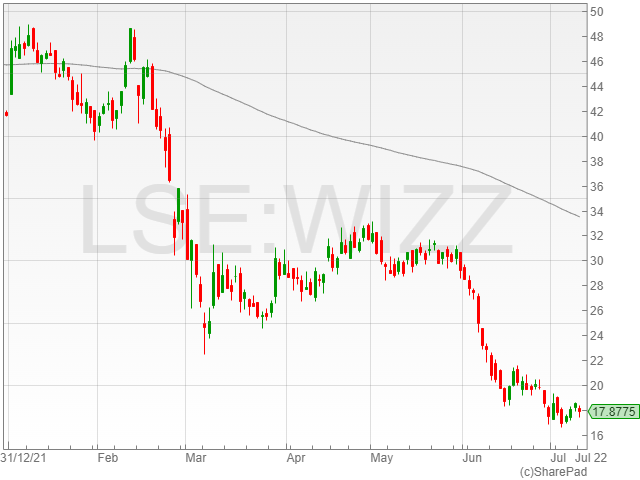Wizz Air shares dropped 3.4% to 1,794.6p in late morning trading on Monday following a disappointing slate of results for the budget airline in Q1 2023, including an operating loss of €285 million and a reported loss of €450 million on the back of unrealised FX losses, disruption costs, lower utilisation in Q1 and an adverse pricing environment.
Available seat miles (ASKs) for the term fell 30% compared to Q1 FY 2020, and grew sequentially month-on-month as the bulk of Covid-19 restrictions were eased over March to May 2022.
Revenue per available seat miles (RASK) was down 10% against Q1 FY 2020, with net fares reportedly in line with FY 2020, however load factor was down 9% at 85%.
Wizz Air commented RASK improved month-on-month, with June RASK at minus 1.5% linked to higher net fares compared to a rise of 6% in June 2020.

The budget travel firm further mentioned a 14% climb in ancillary revenues from Q1 2020, with ticket fares down 12% against the term.
Wizz Air confirmed fuel cost for available seat kilometres (CASK) was up 94% against Q1 2020, driven behind an average fuel price of 1,239 USD/mT. The group reported it had recently announced FY 2023 “insurance” hedge coverage levels, which were completed, along with a return to systemic hedging starting from FY 2024.
The company also noted an ex-fuel CASK rise for Q1 of 16% at 2.6 cts against 2.2 cts in FY 2020, of which disruptions drove a 0.2 cts uptick and an increase of approximately 50m EUR.
Wizz Air added that the balance of the ex-fuel CASK increase from FY 2020 was predominantly driven by a 10% lower than historical utilisation over the period as a result of the gradual month-on-month ramp-up.
The budget airline commented its liquidity remained strong, with its cash balance at the close of the term improving to approximately €1.5 billion, with the company continuing to maintain its investment grade rated balance sheet position.
Wizz Air said its outlook for Q2 2023 included an expected material operating profit linked to revenue and pricing momentum improvements, alongside a higher fleet utilisation to assist improvements towards its historical ex-fuel CASK levels as it works to reduce impact from operational disruptions.
The group also reported an expected continued RASK climb on the back of higher fares and improving load factors, resulting in a high-single digit RASK improvement for Q2 2023 from Q2 2020.
Wizz Air confirmed load factors as of July were set to improve over 90% with a strong fare rate and a reduction in industry impact, alongside high consumer demand.
Wizz Air announced an expected 5% reduction in utilisation against the plan outlined in its FY results in a move to reduce the impact of disruptions. It also expected summer ASK growth of approximately 35% against Q2 2020 levels.
